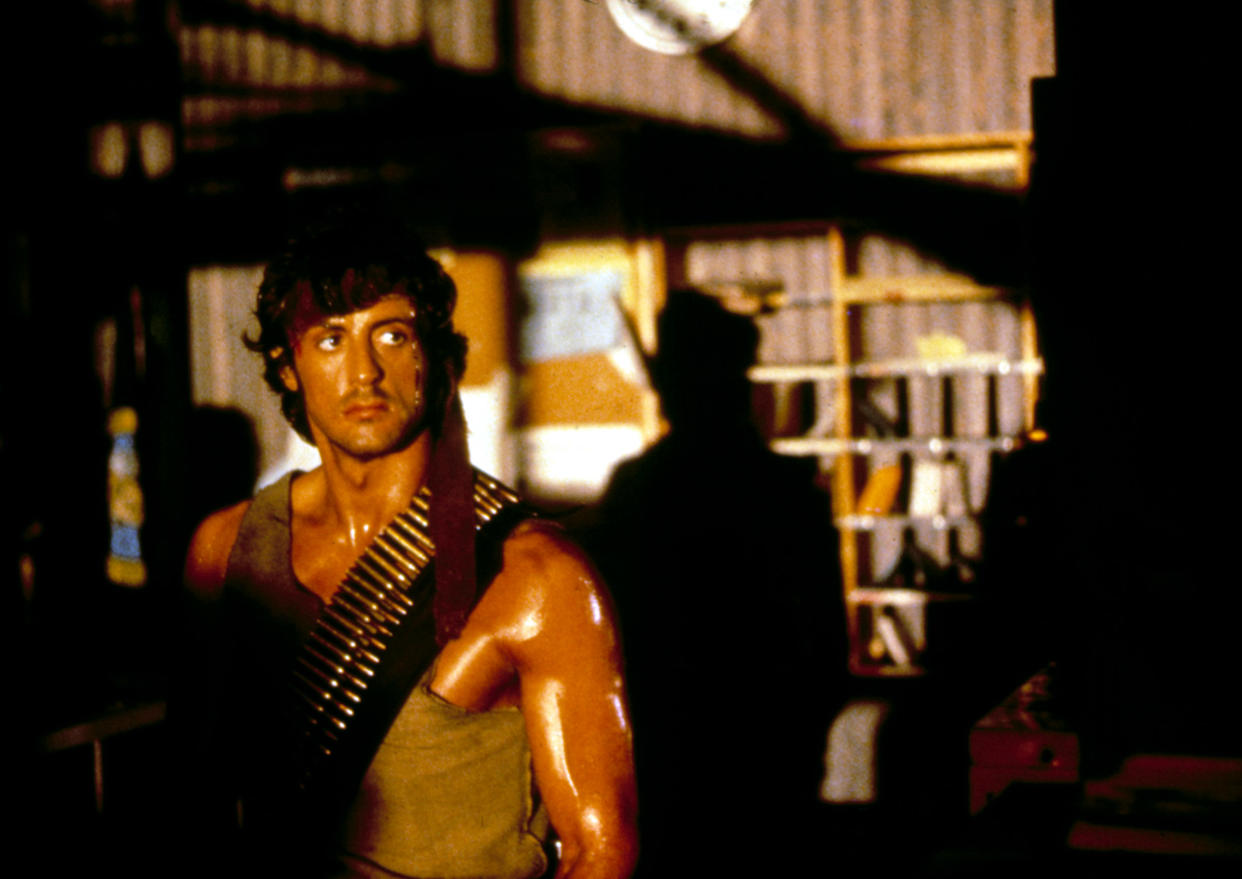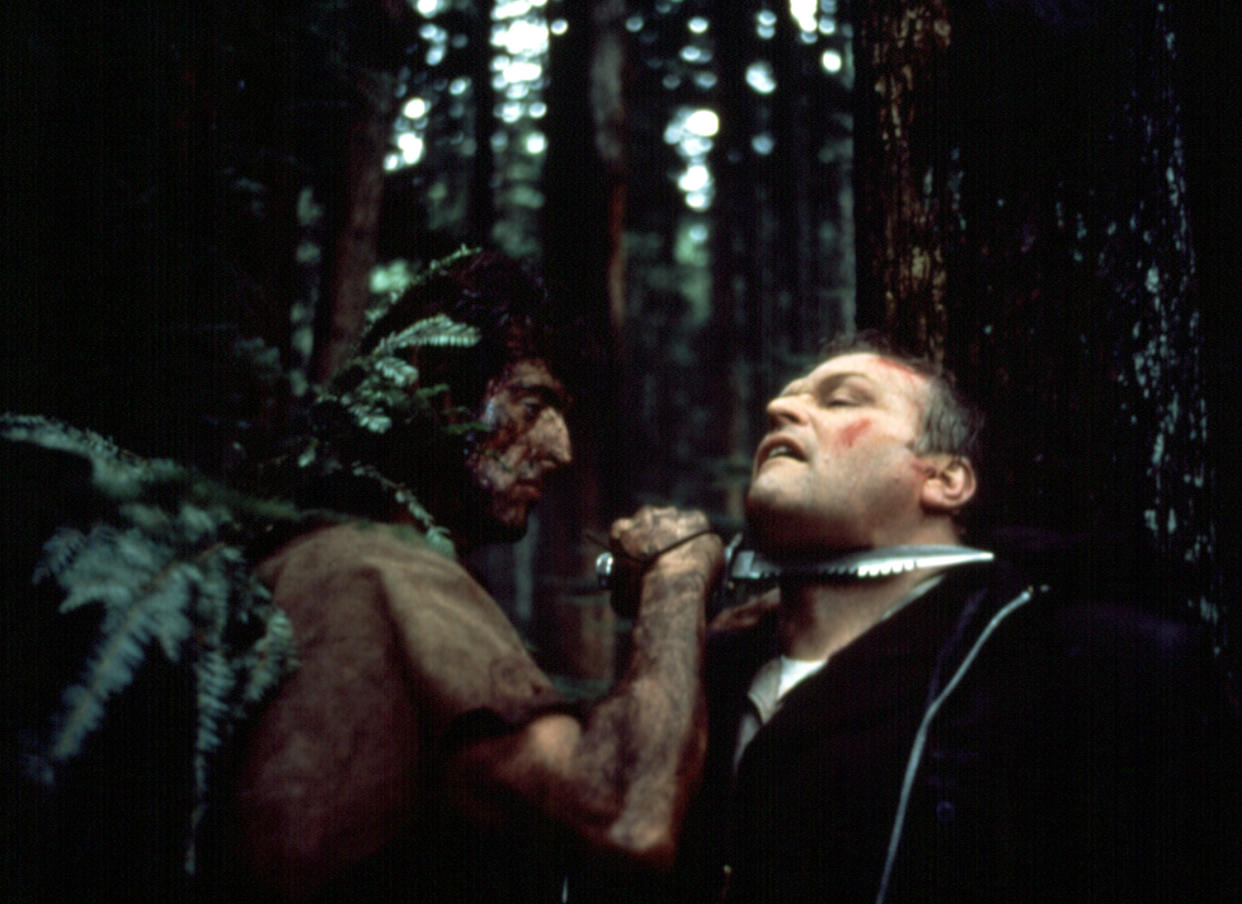Here’s why Sylvester Stallone refused to let Rambo die in the abandoned ending of ‘First Blood’

The first rule of Sylvester Stallone action movies is: Sly always makes it to the end of the picture alive. The Rocky star has a history of dodging death scenes over the course of his career, even when he's scripted them himself. Stallone's original script for Rocky V, for example, ended with the Italian Stallion dying in the arms of his beloved wife, Adrian, until he decided to grant his alter ego a stay of execution.
There are some exceptions to this rule, though, including early roles in 1975's Death Race 2000 and 1978's F.I.S.T. where Stallone died before the closing credits. And 40 years ago, he performed his most famous death scene in the classic ’80s action movie, First Blood, which introduced moviegoers to the actor's other signature character, Vietnam veteran and Green Beret super soldier, John Rambo. But following a protracted behind the scenes battle between Stallone and the movie's director, Ted Kotcheff, that sequence ended up being dropped from the movie in favor of a finale where Rambo survives his one-man war against the small Pacific Northwest town of Hope, Washington and lives to fight another day — and in four sequels.
Premiering in theaters on Oct. 22, 1982, the independently-financed First Blood became a global hit and launched one of the decade's defining franchises. Stallone's death scene endures as a Blu-ray bonus feature, and offers a case study in how action movie history could have been rewritten. "[Stallone said] 'You can't kill Rocky,'" Kotcheff remembers in a behind-the-scenes featurette that addresses the fight over the ending. "I said, 'It's not Rocky — it's Rambo.'"
It's not like Rambo's death came as a shock to Stallone. The movie's downbeat conclusion was taken directly out of the source material, David Morrell's 1972 bestselling novel. The author had been moved to write the book based on stories he'd heard about returning Vietnam vets who now felt unwanted and unwelcome in American society. Speaking with Entertainment Weekly in 2017, Kotcheff said that he was similarly inspired by real soldiers's stories when he signed on to direct the film with the book's ending in place.
"I conceived of First Blood as Rambo’s suicide mission," the director said. "The film was basically conceived as Rambo’s tragedy, that mirrored the tragedy of so many of the veterans that I talked to. I met guys that actually later on killed themselves. His tragedy mirrored their tragedy, and how they came to this sad conclusion to kill themselves."
First Blood opens with Rambo arriving in Hope, hoping to reconnect with a fellow soldier who turns out to have passed away. It's soon made abundantly clear by the local police force — headed up by Sheriff Will Teasle (the late Brian Dennehy) — that he's not wanted there, and their violent treatment triggers John's war-induced trauma. Soon, he's using the guerrilla tactics he learned in Vietnam to overwhelm the cops, forcing them to call in his former commanding officer, Colonel Trautman (Richard Crenna).
In both Morrell's novel and the original version of the film, it's Trautman who ultimately kills Rambo, although Kotcheff significantly tweaked the circumstances of the character's death. Holed up in Hope's police station, John allows the colonel inside for an extended conversation where he bares his soul about what life has been like for him since the war ended.
"Sometimes you get so mad, you think you're going crazy — then it goes away" he tells Trautman, while handing him a gun. "It's not going away anymore, and I can't control it, Colonel. I can't spend the rest of my life in a cell, either. If I've gotta die, I want you to do it." When the ranking officer hesitates, Rambo grabs his hand and the gun goes off, sending a bullet into his stomach and propelling his body backwards in slow-motion. Trautman exits, and the final shot is a close-up of the soldier's lifeless form.
In First Blood's making-of featurette, Stallone indicates that he had a problem with the ending from the moment he joined the film. "It was kind of a jinxed project," he recalls. "I was very nervous. The [first] day of filming I was hoping it would never happen — I hoped it would just go away." (Al Pacino, Nick Nolte and John Travolta were some of the actors who were considered for Rambo before Stallone signed on. Funnily enough, Travolta almost played John's wisecracking sidekick in the early drafts of Rambo: First Blood Part II, written by James Cameron.)

First Blood started production with Hollywood icon Kirk Douglas in the Trautman part. And the Spartacus star was a vocal proponent of having Rambo die in the film, which immediately put him at odds with Stallone, who was furiously rewriting the script. "[Kirk] went, 'Rambo must die, Rambo must die,'" the actor recalls in the making-of featurette. "[I said] 'I understand that, but not in this movie.'"
"I just don’t think it should [have been] done," Stallone continues. "It sends out the wrong message. Every Vietnam vet who sees this [ending] goes, 'The only solution is death. Death is the only thing that awaits us at the end of the tunnel.' I don’t think that’s the right way to do it. [Kirk] was like, 'Yes but it’s artistic.'"
Douglas ultimately quit the movie before filming any scenes, and Crenna was hastily recruited to take his place. In the meantime, Stallone continued to debate the merits of the intended ending. On the First Blood commentary track, the star suggests that he rewrote the final scene in advance of shooting, devising a stream of consciousness monologue where Rambo gets lost in the memories of some of the horrific sights he witness in country. "
"He has so many ideas locked up in his brain, he’s been so silenced by society and his own anger that he can’t put it together," Stallone says, adding that he used actual war stories he'd heard from Vietnam vets in that speech. "I had a big disagreement with the powers that be over this scene, but I felt compelled to give some sense of hope to these guys that if they could somehow be understood or vocalize what their feelings are."
But in his EW interview, Kotcheff offered a different account, describing how he and his leading man invented the theatrical ending on the same day the shot Rambo's death scene. "We shot [the original ending]. It was incredibly moving, after all we’d been through. Sylvester got up and said, 'Ted, can I talk to you for a second?' He said, 'You know, Ted, we put this character through so much....All this, and now we’re gonna kill him? I said, 'Sylvester has a point.'"
"You have to go with your intuitions in making a film sometimes," the director continued. "That thing had been niggling at me in the back of my head: The town killed him. The evil Sheriff killed him. All those people that symbolized America had killed him. They were the evil people who did this."
However it came about, the choice to shoot an alternate ending proved a wise one. When First Blood screened for a Las Vegas test audience, they were violently opposed to seeing Stallone get killed. "There was a dead silence," Kotcheff recalls in the making-of documentary. "Then a voice said: 'If this director is in the audience, he should be strung up from the nearest lamppost.'"

According to Stallone, the ending wasn't the only problem with the early cuts of First Blood. On the commentary track, he remembers believing that the movie would be a career-ending bomb. "I hated the film the first time I saw it, I really did," Stallone admits, revealing that he almost bought the negative just to ensure it never got out into the world. "It went on for three-and-a-half-hours. It was just not working. It needed to be cut. It's not just me — everyone was feeling like, 'This is a disaster.'"
Out of desperation, the movie's producers assembled a 40-minute version of the film to screen for exhibitors and asked the star to introduce it. "I said, 'Are you kidding? The last time I saw this, I was nauseous,'" Stallone recalls on his commentary tracks. "They said, 'It's a different film.' I went out there and spoke as if this was The Godfather."
But then a funny thing happened: Stallone liked what he saw. "I was blown away," he says of that 40-minute cut of First Blood, which brought him back into the fold in a big way. Eventually, Orion Pictures agreed to distribute the movie and Rambo entered the pop culture lexicon for the rest of the ’80s. Stallone finally laid the character to rest — though again, not literally — in 2019's Rambo: Last Blood, which ends with John Rambo riding off into the sunset.
In First Blood's making-of featurette, Stallone says that he crossed paths with Kirk Douglas years after the movie's release and received what he took as a kind of apology for their dispute over Rambo's fate. "Kirk goes, 'You know what? My way was still the better way, Sly. It was artistic, but then again it would have cost you about a billion dollars! If you listened to me, you would have been broke but politically and artistically correct.'"
First Blood is currently streaming on HBO Max
